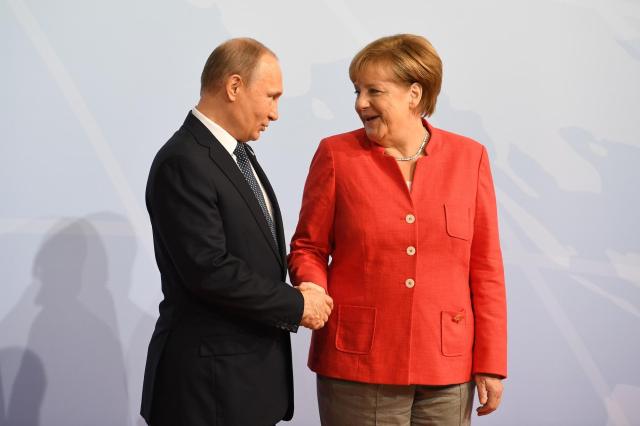Credit: Stefan Rousseau – Pool/Getty Images

There was a time when right-wingers accused left-wingers of being too close to the Russians rather than the other way round. Indeed, ‘hawkishness’ on Russia was seen as a stereotypically conservative position.
As recently as 2012, Mitt Romney – when he was the Republican Presidential candidate – described Russia as America’s “number one geopolitical foe.” He was criticised and mocked at the time, though not so much since Russia’s annexation of the Crimea, Putin’s intervention in Syria and other demonstrations of Russian military and diplomatic muscle.
And then there’s the home front, where liberals in America and other western countries are worried, some would say paranoid, about Russian interference in the democratic process. The allegations and rumours surrounding Donald Trump and his relationship to the Russians are a particular cause for concern.
But consider this scenario: Trump leaves office and takes up a lucrative position with a majority Russian-owned company – and not just any company, but one responsible for an energy infrastructure project of great geopolitical significance. Can you imagine the reaction that would provoke?
Funnily enough, something very much like it has already happened – except not with a former American President, but a former German Chancellor, i.e. Angela Merkel’s immediate predecessor, Gerhard Schröder.
Not long after leaving office in 2005, Schröder was appointed to the board of Nord Stream AG (whose majority shareholder is Gazprom, the Russian state-controlled gas company). The company was formed to build and operate Nord Stream 1 – an underwater natural gas pipeline that runs from Russia to Germany across the Baltic Sea.
For reasons I’ll come on to, Nord Stream 1 was highly controversial, but that hasn’t stopped the development of a second pipeline across the Baltic, called Nord Stream 2.
A Bloomberg editorial explains why a number of countries; including America, are opposed to the new project:
“Due to be completed in 2019, the pipeline will double the amount of gas Russia transports directly to Germany across the Baltic Sea. Nord Stream 1, completed in 2011, supplies 55 billion cubic meters a year to Germany; the second pipeline would allow Gazprom, Russia’s state-owned gas company, to funnel an additional 55 billion cubic meters over the same route.”
This strengthens Russia at the expense of its immediate neighbours:
“This would deprive Ukraine of up to $2 billion a year in transit fees, roughly 1.5 percent of the country’s gross domestic product. It would also make Ukraine more vulnerable to Russian gas cutoffs — which the Kremlin could use to exact territorial concessions from Kiev.
Gas that gets to western Europe from Russia also passes through countries such as Poland, Slovakia and Hungary, all NATO members. They, too, are at risk of being denied supplies and transit revenues once Nord Stream 2 comes online. Poland’s government has called the pipeline a ‘hybrid weapon’ created by Moscow to divide the EU and NATO.”
Even before Nord Stream, dependence on Russian gas was seen as a threat to Europe’s energy security. The worry was that Putin could ‘turn off the tap’ and plunge Europe into freezing darkness. Of course, it’s not that simple. For a start, a pipeline of gas from Russia to the EU is also (figuratively) a pipeline of money from the EU to Russia – Putin cannot cut off the gas without cutting off the cash.
But what if he threatened to cut off supply selectively – putting pressure on Russia’s immediate neighbours, while continuing to sell at top dollar to western Europe? Again it’s not that simple, because the existing network of overland gas pipelines go through eastern and central Europe to get to western markets. The same jugular veins serve both sides of the old Iron Curtain.
Nord Stream 1, however, changes this by providing a bypass. In cooperating to build it, Germany and Russia have shafted the countries that lie between them (not the first time that’s happened).
In proceeding with Nord Stream 2, Germany is literally doubling down on a policy that many of its friends regard as deeply selfish. The two Presidents Donald – Trump of America and Tusk of the European Council – are for once united in opposition. And yet Germany seems determined to press ahead.
It’s another reason to challenge the notion of Germany as the responsible adult of international politics. Trumpish America, Brexity Britain and riotous France may be more obviously dysfunctional, but that’s no reason to overlook German irresponsibility.
A nation that makes such a weak military contribution to Europe’s defences really should not have undermined its energy security.
There are voices in Washington calling for sanctions on companies involved in the pipeline. The Bloomberg editorial urges a less confrontational approach:
“The U.S. can support European political parties and interest groups lobbying Merkel to abandon the project… It should urge the European Commission to examine whether the pipeline makes member states vulnerable to Russian aggression and undermines EU goals for energy diversification. And it should promote alternatives to Russian gas, including increased imports of liquefied natural gas from the U.S.”
The Trump administration should also abandon its hostility to the low carbon energy solutions that are the ultimate answer to the West’s dependency on fossil fuels.
Tackling climate change isn’t just about heading off an environmental threat whose worst effects may still be decades away; it also strengthens the security of the West right now.










Join the discussion
Join like minded readers that support our journalism by becoming a paid subscriber
To join the discussion in the comments, become a paid subscriber.
Join like minded readers that support our journalism, read unlimited articles and enjoy other subscriber-only benefits.
Subscribe